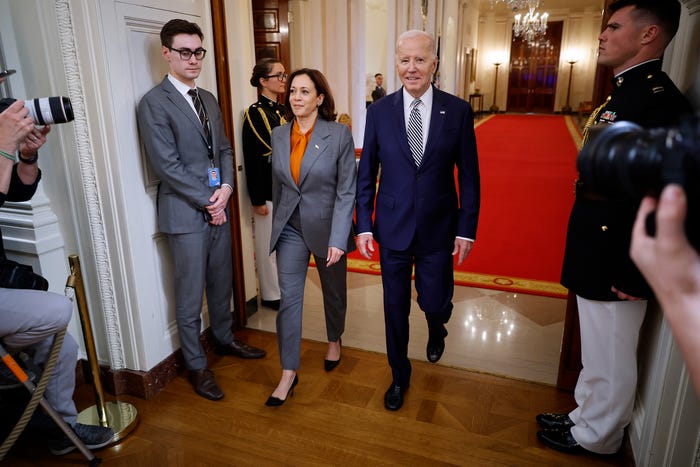President Joe Biden’s recent debate performance against former President Donald Trump has sparked significant concern among Democrats. Many within the party had hoped that Biden would use the debate to reassure voters about his capability to serve a second term, especially given the ongoing concerns about his age. However, his performance fell short of expectations, leading to a wave of anxiety among party leaders and supporters.
This situation has brought to light a longstanding issue within the Democratic Party: the slow pace of transferring power to younger generations. For two decades, House Democrats were led by veteran lawmakers like Nancy Pelosi, Steny Hoyer, and Jim Clyburn. It wasn’t until 2023 that a Gen Xer, Rep. Hakeem Jeffries, took over the leadership of the caucus. This delay in promoting younger leaders has often left the party struggling to build a robust pipeline of future leaders.
In the 2020 election, Biden positioned himself as a “bridge” to a new generation of Democrats. However, four years later, he decided to run for reelection, highlighting the party’s resistance to generational change. His debate performance against Trump underscored this issue, raising questions about whether Biden should continue his campaign. If he remains in the race but fails to convince voters of his readiness, it could jeopardize the Democrats’ chances in other critical races.
The recent elevation of younger leaders like Jeffries, Katherine Clark, and Pete Aguilar has been a positive step towards generational change. Biden’s choice of Kamala Harris as his vice president also represented a symbolic passing of the torch. However, these efforts may be too little, too late. If Biden stays in the race, Democrats need him to perform well to avoid negative repercussions for down-ballot races.
Regardless of Biden’s decision, his debate performance is likely to accelerate efforts within the Democratic Party to cultivate younger leaders who could eventually run for the White House. With Gen Xers, millennials, and Gen Z making up a significant portion of the electorate in the coming decade, the party must prioritize this generational shift.
In early September 2023, concerns about Biden’s candidacy were already being voiced. Special Counsel Robert Hur’s comments about Biden’s memory struggles further fueled these worries. Despite these concerns, many Democrats, including the author of this article, remain committed to voting for the Democratic nominee, even if it’s Biden. This commitment stems from a strong opposition to the Republican Party and its alignment with Donald Trump.
However, the Democratic Party’s decision to stick with Biden, despite his low approval ratings and concerns about his health, has been met with frustration. Biden’s approval rating stands at a steady 38.5 percent, significantly lower than previous presidents at this point in their terms. Additionally, 76 percent of the country, including half of Democrats, worry that Biden lacks the necessary mental and physical health to serve a second term.
Partisan Democrats have responded defensively to these concerns, dismissing them as political attacks. However, this approach may not be effective in reassuring voters. Many people, including well-educated, professional liberals, have expressed doubts about Biden’s ability to serve another term. These concerns are not unfounded, given Biden’s visible signs of aging and frailty.
The Democratic Party’s reluctance to address these issues head-on has led to a sense of déjà vu. In 2016, the party faced a similar situation with Hillary Clinton, who was under investigation by the FBI. The party cleared the field of plausible opposition, confident that Clinton could defeat Trump. However, this strategy backfired, leading to Trump’s victory.
Now, the party seems to be repeating the same mistake with Biden. The combination of risk aversion and arrogance has led to a situation where the party is sticking with a candidate who may not be the best choice to defeat Trump. This approach could have serious consequences for the 2024 election.
The Democratic Party needs to take decisive action to address this issue. Leading figures within the party should speak to Biden and urge him to step aside in favor of a younger, more dynamic candidate. If Biden refuses, the party may need to resort to more drastic measures, such as leaking information to the press to pressure him to withdraw.
While this process is far from ideal, it is necessary to give the party a fighting chance against Trump. The party should also make it clear that no one is entitled to the presidential nomination. If Kamala Harris wants to be the nominee, she should compete against other formidable candidates like Michigan Gov. Gretchen Whitmer, Pennsylvania Gov. Josh Shapiro, and California Gov. Gavin Newsom.
Ultimately, the Democratic Party needs to focus on running popular, charismatic candidates who can win elections. The time to address this issue is now, before it becomes too late. The party must prioritize the good of the country over individual ambitions and make the necessary changes to ensure a successful campaign in 2024.
Source: Various News Outlets



